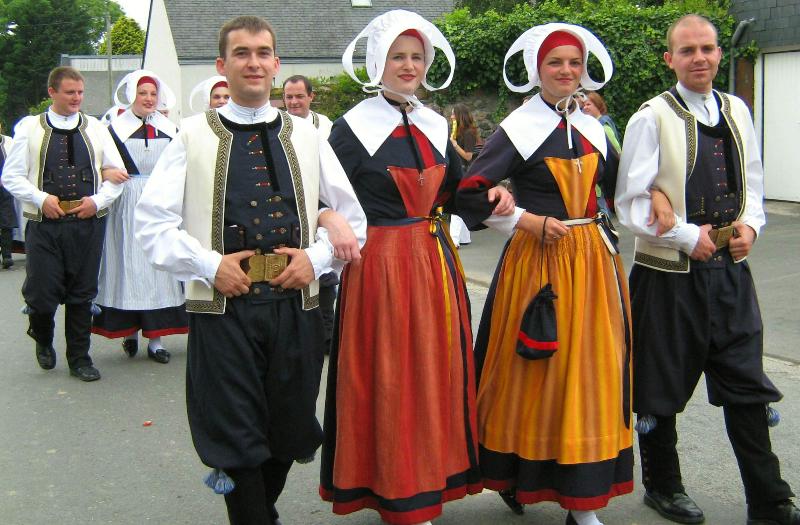
French national costumes. Les costumes regionaux de la France. Costume History
Traditional French clothes in Brittany, Alsace and Provence - Complete France Stitch in time: A quick guide to French folk costumes First published: 18 March 2022 by Helen Parkinson By Helen Parkinson Far from being cut from the same cloth, find out how France's traditional costumes are a sartorial salute to regional diversity

Boutis, petits points et petits pots Biennale de la jupe piquée à Trets 1314 septembre 2014
Traditional French national costumes. Les costumes regionaux de la France. Costumes traditionnels français. BRITTANY Brittany. Region of Quimper, Département Finistère. Brittany. Region of Pont-l'Abbé, Département Finistère. Brittany. Region of Elliant, Département Finistère. Brittany. Woman of the town of Batz, Départements Finistère. Brittany.

Traditional French national costumes. Woman folk dress from Bourbonnais Traditional french
The clothing of France is famous throughout the world. History 17th century, the Baroque and Classicism Louis XIV, the "Sun king" was the absolute monarch of France, made his kingdom the leading European power and was the fashion idol of the Baroque age. Fashion prints

Folk costumes of Europe (women's edition) Traditional french clothing, French traditional
11 th to 13 th Century French Fashion. French fashion went through a whirlwind of changes during the medieval period. The variations were so frequent and sudden that people barely had time to catch their breaths before the new trends were thrust upon them.. 11 th Century. During the 11 th century, men were used to their long and tight-sleeved tunics. Fashion in France was adopted from the.

French Culture française depuis le début
France National Dress, also known as traditional dress or regional costumes, has a long and fascinating history that dates back to the medieval times. In this article, we will take a closer look at France National Dress, its history, evolution, and significance, and answer some frequently asked questions. Table of Contents

Pin on Galia ThomasLook of the Day 2014
T Textile arts of France (4 C, 13 P) Pages in category "French clothing" The following 12 pages are in this category, out of 12 total. This list may not reflect recent changes . B Bliaut Breton costume C Can-can dress Chemise F Faluche French hood K Kepi M Mantua (clothing) P Paletot Pantalettes Poulaine S Salouva

French costumes from the department Finistère, Bretagne. French costume, Traditional french
The beret is probably the most well-known item of traditional French clothing but there are others, and each is specific to a certain place in France. Here's your chance to do a little 'fashion tourism'. Read about the most famous traditional French garments and visit the places they're from. The paletot coat from Orsay

Festival de Cornouaille 2013(6) Traditional french clothing, Folk clothing, Traditional outfits
Traditional French clothing was designed to be functional and comfortable. As time went on, French clothing became more detailed, and elaborate, reflecting different class systems and cultures. Clothes were made by highly skilled artisans who passed on their skills for generations.

Fashion Style What to Wear in Paris 10 French Fashion Style Tips
1. The Main Influences on French Medieval Fashion. French medieval fashion was influenced by a variety of factors, including social status, religion, and cultural exchanges with other European countries. One of the main influences on French fashion during this period was the clothing worn by the nobility. The French nobility had a significant.

French national costumes. Les costumes regionaux de la France.
1. The Can-Can Dress 2. The Paletot Coat 3. The Beret 4. Bliaud 5. Chemise 6. Breton 7. Kepi Caps 8. Faluche 9. Mantua 10. Pantalettes Traditional Clothing of France in General

Pin on France
Wear minimalistic, simple clothes. Don't overload your outfit with delicate pieces. Wear neutral tones. If you want to dress like a Parisian girl, your clothes shouldn't be in more than three colors. For an elegant night outfit, wear only two colors maximum. And remember, that all black is your always-safe outfit.

PlougastelDaoulas Traditional french clothing, Culture clothing, Traditional dresses
Sarah Nait summed it up nicely, telling Who What Wear, "In my opinion, the iconic 'French style' can be defined as a capsule wardrobe composed of perfectly tailored clothes and statement pieces that work with your silhouette." Keep reading to find out the key classic French fashion pieces to hold onto. CLASSIC FRENCH FASHION STAPLES

Pin on France
This was a brief period of mindful revolt by the surviving members of the upper classes against the terror and restrictions of the revolution, and once it was over, women's fashion returned to a more modest and sober feminine style. france Francois Boucher We love art history and writing about it.

Épinglé par Just Jacx sur 2. Cherished Children Costume français, Costume, Robe traditionnelle
Fashion in France: A Haute Couture Symphony Behold the elegance that graces the boulevards of Paris, where the world of fashion becomes a symphony of style. France culture boasts a legacy of haute couture, with Paris reigning as the unrivaled fashion capital of the globe.

Clothing French traditional clothing consisted of dresses, skirts, pants, stylish hats and many
Hyacinthe Rigaud - WikiCommons Under King Louis' reign, the creation of the fashion press thrust France into the spotlight, and was the first of its kind to separate different styles into seasons. These fashion pictures were distributed throughout the French court, and to other places in France and around the world.

Вѣяніе былого ВКонтакте French Country Style, French Country Decorating, Traditional Fashion
While a lot of foreigners imagine striped shirts, a knotted scarf and berets as a "traditional" French outfit, the reality is as varied as any other Western culture. Although regional clothing (like the headdress and embroidered dress of the Alsace region) is no more, fashion remains a tradition.